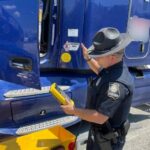The Environmental Protection Agency (EPA) has issued a final rule on heavy-duty truck tailpipe emissions, but engine manufacturers and trucking organizations have said that compliance will be difficult. The EPA had earlier proposed two options to reduce nitrous oxide (NOx) emissions, either a two-step process with stricter standards in 2027 and 2031 or a one-step standard in 2027 that would be less aggressive. The EPA ultimately chose a one-step standard change in 2027 that is “largely consistent” with the original, more strict two-step option.
“The final new numeric NOx standards will result in the greatest degree of emission reduction achievable for a national program starting in MY 2027 through the application of technology that the [EPA] Administrator has determined will be available starting in MY 2027, after giving appropriate consideration to cost, energy, and safety factors associated with the application of such technology,” EPA stated.
The new standards for heavy-duty truck tailpipe emissions, the first revision for Nitrous Oxide (NOx) pollution since 2021, will be more than 80% stronger and increase the life of governed vehicles by 1.5 to 2.5 times, according to the Environmental Protection Agency (EPA). The rule also includes provisions for longer engine useful life and warranty periods, and will yield emissions warranties that are 2.8 to 4.5 times longer than current standards.
“The rule also requires manufacturers to better ensure that vehicle engines and emission control systems work properly on the road,” the agency noted. “For example, manufacturers must demonstrate that engines are designed to prevent vehicle drivers from tampering with emission controls by limiting tamper-prone access to electronic pollution controls.”
The Truck and Engine Manufacturers Association (EMA), which had preferred EPA’s proposed one-step 2027 standard option, contended that the final rule “is very stringent and will be challenging to implement,” stated EMA President Jed Mandel.
However, “our members are fully committed to working with the EPA and other stakeholders for its successful implementation,” Mandel said. “Ultimately, the success or failure of this rule hinges on the willingness and ability of trucking fleets to invest in purchasing the new technology to replace their older, higher-emitting vehicles.”
Chris Spear, American Trucking Associations president and CEO, is assessing the effect the rule will have on its members and agreed that EPA’s success in eliminating pollution through the rule hinges on the purchasing decisions made by the trucking industry.
“ATA remains extremely concerned over the potential growth of state patchworks of NOx emission standards that will create havoc for an industry that operates across local, state and international boundaries,” Spear added. “We hope EPA and the California Air Resources Board [CARB] will ultimately agree to a uniform, single standard that best achieves our nation’s environmental goals.”
CARB’s NOx rule, which became effective in December 2021, requires stricter emission standards for heavy-duty engines starting with the 2024 model year and becoming even more strict for the 2027 model year and beyond. Todd Spencer, the President and CEO of the Owner-Operator Independent Drivers Association, had previously argued that both options proposed by the Environmental Protection Agency (EPA) were unworkable and unaffordable for drivers. He stated that the final rule does not change this outlook for his members.
“If small business truckers can’t afford the new, compliant trucks, they’re going to stay with older, less efficient trucks or leave the industry entirely,” he said. “Once again, EPA has largely ignored the warnings and concerns raised by truckers in this latest rule.”
The rule goes into effect 60 days after it is published in the Federal Register.





